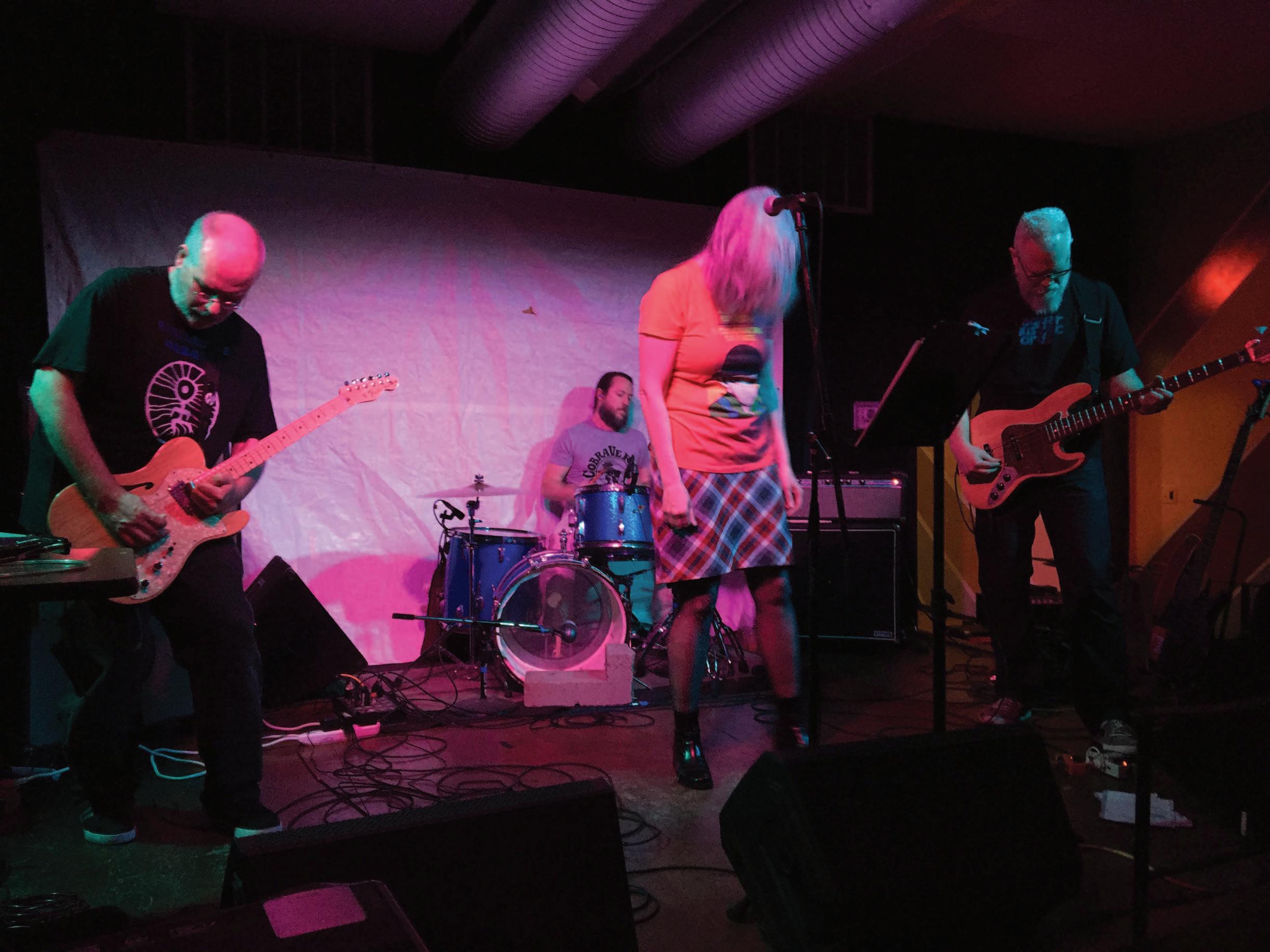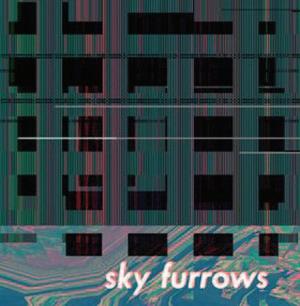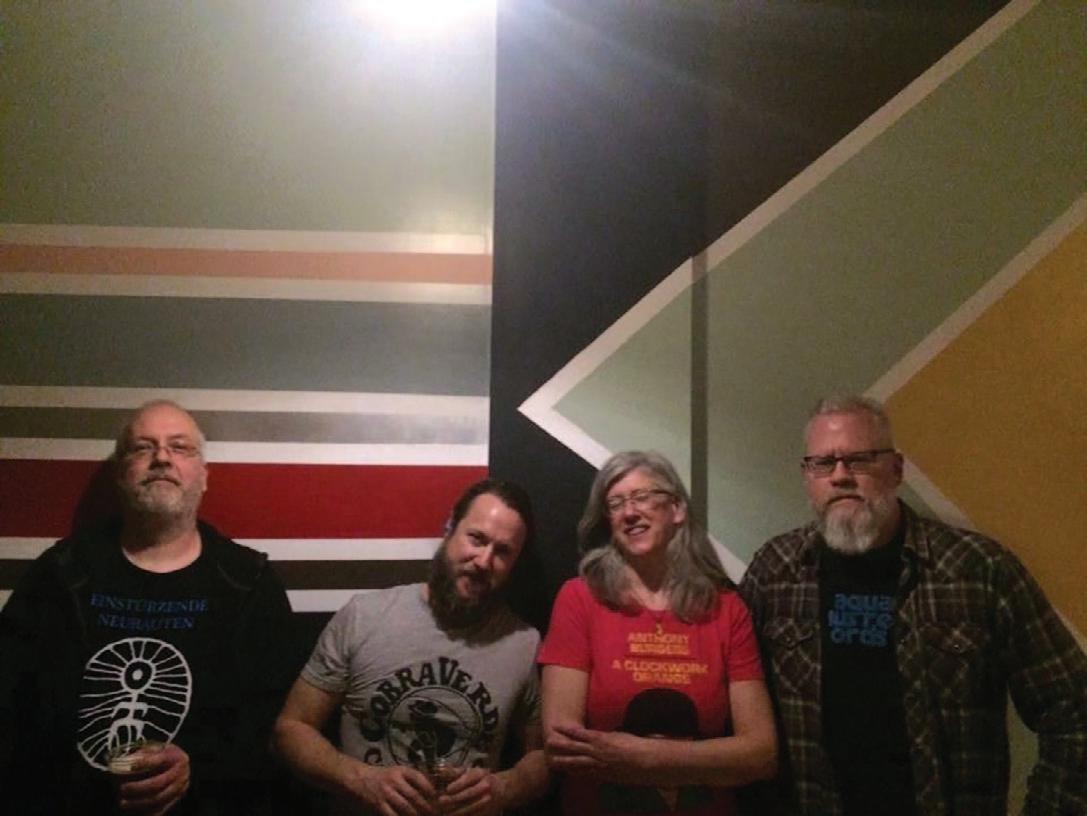
4 minute read
Upstate Beat
Controlled Burn

Advertisement
The vivid words of poet Karen Schoemer and the blazing art-rock of her bandmates ignite in Sky Furrows.
“Alyosha,” the opening track from the debut album by Sky Furrows, is a perfect soundtrack for the waning-light days of early winter. The spoken-word lyrics from poet Karen Schoemer spill over an evocative guitar line by Mike Griffin and discreet rhythms from drummer Phil Donnelly and bassist Eric Hardiman. Schoemer’s haunting lines — “Secrets are the skin I wear. Silence is the song I sing” — tumble out over an ecstatic guitar burst and echo over enigmatic lines about flicked cigarettes, parked cars and leather jackets, ashtrays and prescription pills, and the risks of saying the wrong thing versus choosing to remain silent.

Schoemer’s perceptive words form the foundation of Sky Furrows’ songs. The band draws from many of the same musical influences: ‘80s post-punk and underground rock, early ‘90s indie rock like Sonic Youth, and jangle rock from New Zealand artists like the Clean and the Verlaines. Around Schoemer’s expansive lines, Griffin, Donnelly, and Hardiman construct a musical framework that builds on their background in improvisation. The trio first bonded in Albany’s long-running psych-rock unit Burnt Hills, a loose collective of musicians who get together informally to play free-form rock and noise.
The members of Sky Furrows had chemistry the first time they jammed as a four-piece in Griffin’s Clifton Park basement in 2017. “The first time we played, I remember distinctly,” says Hardiman, who also performs solo as Rambutan and with bands Spiral Wave Nomads and Century Plants. “The four of us got together, and we all just started riffing. It formed itself into a song that lasted like 15 minutes. I don’t know if we said it out loud, but I remember thinking that we have to be a band.”
Sky Furrows’ first live performance, at BSP Kingston in Kingston, New York, generated similar alchemy. “Playing that show was one of the most exhilarating things I’ve ever felt,” Schoemer says. “It was just so exciting. I was like, ‘Can we do more of this, please?’”
For much of Schoemer’s artistic life, she’s been a poet, music writer, and spoken word performer. It wasn’t until 2014 that she started incorporating her words with music through collaborations with bassist Mike Watt (Minutemen) in the band Jaded Azurites and with Catskill singer-songwriters Wreckless Eric & Amy Rigby in the Schoemer Foundation.
“I had never performed with music in my whole life,” she says. “I’d never done any kind of band thing and never thought I would. I had written about music for such a long time. I was used to being an audience member. So, I feel lucky to do it. It’s so fun.”
Onstage, whether performing mood-inducing originals like “36 Ways of Looking at a Memory” or a rare cover song, like the Clean’s “Point that Thing,” Schoemer’s delivery ranges from deadpan to a controlled fury. Sometimes she clutches sheets of lyrics while tossing her head, staring at the floor. Her words conjure emotion and concrete images that build. A drive on a winding road by the sea, with waves and spray visible on black rocks below, leads to murmuring words, bursts of laughter, and footsteps in a haunted motel room (“Ensenada”).
The band shares an equally skillful ability to measure out their mood, shifting from sparse and meditative touches to raw, full-on freak-outs within the span of a song. Although the band first built a rapport through improvisation, their songs have structure, with Griffin laying much of the foundation with his expressive guitar work. “I think we are all excited to be doing something based around songs as opposed to improv,” says Donnelly. “We started off improvising to the music, but we started playing with structure as we got more comfortable with the music and the material Karen wanted to bring in. The songs have been fluid. It’s worked.”
Writing poetry is a different process from writing lyrics for music, Schoemer says. “In terms of poems versus a song, to me, they’re really different, even though they’re closely connected. A poem someone will read probably one time from beginning to end, whereas a song has all this opportunity for repetition and building. The minute you add music, I always feel that’s what people hear first. They’re experiencing the music on a much more immediate level. It’s a lot more freeing to write when there’s music, because the music does so much of the work of engaging who’s listening.”
“One of my favorite things about her vocal style is her ability to be so rhythmic and so deep at the same time,” says Griffin, who also performs solo as Parashi. “It reminds me of people like Mark E. Smith [the Fall], that kind of vibe.”
“Karen’s sense of timing and how she delivers her lines in relation to the music, literally from the first time we played together, just blew me away,” adds Hardiman.
Sky Furrows’ self-titled album was recorded at Verdant Studios in Vermont in 2018 but released this fall on three labels: Donnelly’s Philthy Rex Records, Hardiman’s Tape Drift Records, and Griffin’s Skell Records. The album, available on Bandcamp and at local record stores, is tiding the band over until they can play live again, post-pandemic.
“We released it in a very uncertain time when lots of people are suffering,” says Griffin. “And we can’t play shows. But at the same time, it still feels good on an aesthetic level to be doing this. I think it would have sucked to let this album rot away.”
Visit skyfurrows.bandcamp.com





